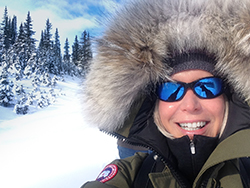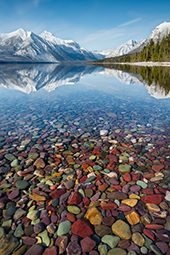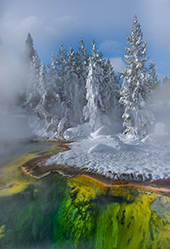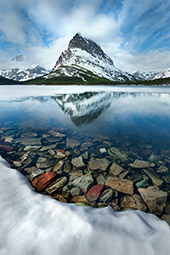
|
|
|||||
|
Featured Photographer, August 2017: Perri Schelat
We are happy to have Perri Schelat as our featured guest photographer this month. We appreciate that she gave us some of her time and generously shared her beautiful photography with us! Please visit her links to see more of her work, and to let her know you enjoyed this interview. :: How did Photography become your medium of choice? My path to photography was propelled by a need for artistic expression, guided by my desire to communicate my love of nature and impeded by the requisite to earn a living. My need for artistic expression goes back as far as I can remember. From the time I was very young, I was creative. I used to rearrange my room, draw on the antique wallpaper, gouge cartoons in my bedside table, all very much to my mother's dismay. As the years went by, I found drawing, working with clay sculptures, bedazzling and painting T-shirts, flower arranging and some photography, as rewarding means of embracing my creativity. As with many, these outlets were always limited by time available as I was working full time. So, my photography was really limited to vacations, where I enjoyed recording memories of where we'd been. I seemed to be able to compose a fairly decent image and I loved the process of picture taking. My husband had given me a Minolta point-and-shoot. I remember taking my Minolta to the Mall where we bought it, to get it repaired. I ended up tossing the camera in one of my shopping bags. For reasons unknown to me, that may require much more time, pages and excuses, than is appropriate for this interview, I will just say my Minolta went missing, which actually turned into a blessing because my first SLR replaced it. I spent a significant amount of time putting one foot in front of the other every day, engaged in routines and a job that paid the bills, but that didn't move me and certainly had nothing to do with art. I had many internal discussions about finding a passion that would balance out the doldrums of working and allow me to be creative, while providing something to look forward to. I remember wanting to quit my job, but I knew I couldn't do that unless I had a direction and focus. After I participated in a couple of photography workshops, I was challenged and gratified by the countless creative opportunities a camera provides. I finally decided that focus and subsequent passion would be photography. I set out to get as much education as I could at local colleges for a couple of years, while one of us was still working full time. When my husband retired, we moved to Montana, and I spent a few months in photography school but really came into my own as a landscape photographer exploring and shooting in Glacier National Park, that was only three hours from my front door. It was during this period, for the first time in my life, I understood my purpose and knew I was where I should be, doing what I was supposed to be doing. I was happy. I guess you could say it was the next six years spent in Montana, in Glacier and traveling for photography that created the foundation from which I could grow and realize my passion was so much more than just taking pretty pictures. Photography had become my lifeline and extension of my creativity, where I could express myself through my art. :: How did landscape photography become the subject of choice? Let's see. I am a traveler at heart, I love seeing new things, I love nature and grand landscapes and landscape photography is a way to do all those things at once. I have always been drawn to the grandeur and beauty of nature and landscapes. For me, the challenge has always been to communicate the feelings of awe and wonder that I experience when I am exposed to a landscape scene. Sometimes it can be as simple as finding a striking composition of a scenic vista, but more often it involves searching for details in the vista that communicate elements of its beauty. I am constantly drawn in by that challenge that keeps me coming back for more and more. When I discovered all that our National Parks have to offer and loved traveling to them, landscape photography simply followed. I have many interests in photography and they don't all include landscapes, but I continually return to landscapes. :: You mention that your work defines you...what exactly does that mean? On the contrary what do you think it means to have work that does not in some way define you? I may not be able to express exactly why I feel I am defined by my work as a landscape photographer, because it feels intensely personal and has to do with what moves me spiritually, emotionally and physically, sometimes things that have no explanation, but more of a feeling. I can try. I want to instill much of myself, my emotions, and my appreciation of the subject matter into my work. It is my hope, then, that by looking at my images the viewer gets a sense of who I am, where I find beauty and what things matter to me. I guess you could say I feel like my work provides a better sense of who I am, than I ever could in a conversation. To me, photography is not simply a job, or means to an end, a medium to express, it's more of an underlying drive, passion and vehicle to live my life to its fullest by connecting me with the things I love: nature, exercise, spirituality, freedom and creativity. It's the reason I want to get up in the morning and it's the last thing I think about at the end of the day. To have work that in some way doesn't define me is easier to explain I think. When I was employed in corporate America it was really simply a means to pay the bills. I cared about the quality of the content of my work, of course, but I cared nothing about the industry. I had insurance and a paycheck. My life began at the end of the day when I went home and I lived for weekends and vacations. But isn't this how lots of people live their lives? Like many, I existed and learned not to hate it and accepted that this was what grownups did. The job itself denied me any sort of creativity and I always felt like a fish out of water in day-to-day administration and meetings. :: What challenges you the most these days with photography? Dealing with the day-to-day pressures of getting my work seen and staying relevant feels like a constant struggle. Pushing through trying not to get lost in the weeds, while I manage my social media accounts and other means of sharing I participate in. I am constantly challenged with the task that I must exceed my last "popular" photograph by one-upping myself in an effort to keep people focused and interested. I sometimes feel like I will just drop off the social-media radar if I don't continue to contribute exciting imagery regularly. Exercising and staying in shape to remain strong and capable in landscape photography is one of my highest priorities, because shooting from the side of the road is not always something I enjoy. I enjoy the hunt for the photograph that might involve long hikes and scrambles carrying heaving backpacks. It's also quite likely that people I take a trip with are quite a few years younger and need to keep up and carry my own gear. I'm continuously challenged trying to find a balance between fieldwork and studio time. I realize I need to spend equal amounts of quality time in my photo studio for my photography to bear fruit. :: What is on your bucket list, or something that you still haven't been able to capture the way your mind sees it? My bucket list is ever growing; it will never see its end. Off the top of my head I'd list seascapes, additional alpine locations, deserts and European countryside. Combining a backpacking adventure with photography is exactly where I'm at right now. I want to challenge myself physically and technically, while photographing something beautiful. This decision has not come without waffling back and forth though because I often underestimate my physical ability, especially as each year passes. I want to expand my seascape portfolio and I'm very interested in learning over-under water photography, which for me translates into a tropical destination. Exotic beaches, sparkling blue waters, white sand and palm tees. I'd be really keen on visiting the shores of French Polynesia, the West Indies, or islands in the Indian Ocean like Seychelles. I'd like to photograph more alpine locations, pristine alpine lakes surrounded by flowers, or mountainous winter scenes. I'd like to get back into the San Juan Mountains for flower season, explore parts of the Sierras that I've never seen, back to the Canadian Rockies for new locations and I would love to make my way to the Italian and French Alps. I really can't believe that I photographed in the desert for the first time last March. I mean to say that I have no desert photographs!! I had the impression that I didn't like deserts. I recently went to Death Valley and that changed everything. I'm looking forward to adding Bisiti Badlands, White Sands, Oregon's Alvord Desert, some spots in Arizona and Utah and Death Valley again to my list of desert destinations. Making plans for a European photography trip is on my radar and in the near future which might include Scotland and Ireland for their stunning sea cliffs and small country villages. There are many places I've been to photograph where I haven't been successful capturing them the way I had hoped. I've been back to some multiple times and there are some I still want to go back to, many in the Canadian Rockies, some in Glacier NP and Iceland. I guess a good reason why I haven't ventured overseas other than Iceland, is because I've spent so much time returning to places in North America. :: How much of your process is pre-visualization and how much is collected from what you find when you get on scene? :: How much of your process is pre-visualization and how much is collected from what you find when you get on scene? Maybe 70% is pre-visualization. In my minds eye I see a scene a certain way. Everything doesn't always come together though, probably more often than not, but when it does it's just that much sweeter to succeed. 30% of the time I might arrive with no preconceptions of what I want. I just want to roam and see what I find. Sometimes those opportunities can be the most rewarding and surprising, because I've not closed my mind with a precise pre-visualization. I think success can be achieved with both these approaches. If I am going to a place that has limited compositional opportunities that has been photographed before, I will spend a significant amount of time beforehand focused on how I can make my image different and I will also spend a lot of time on location looking for a fresh idea. Maybe that's shooting the scene under stars, putting a twist on it, or just waiting for a great weather system to compliment it. An example comes to mind for pre-visualization: Capturing Swiftcurrent Lake in Glacier NP, in early spring. I had never seen any images from early spring before the road opened. My vision was to catch Swiftcurrent Lake in the midst of spring thaw, with a snowy Mount Grinnell reflecting in the water. The only uncertainties would be… well everything. There was no webcam then and I had no idea about the degree of spring thaw on the lake. I realized it was a lot of work and risk, but at the same time a great adventure. In early April, I headed to Glacier, parked my Jeep at the gate and rode my bike 12 miles to Swiftcurrent Lake to scout my shot. The lodge and motels were still closed, but it was really comforting to run into the winter caretaker. Don't think there weren't visions in my head of Jack Nicholson in the Shining when I ran across this seemly nice gentleman. I set out to scout, with some scrambling around; I found an opening in the ice that allowed for the reflection of Grinnell. I would have photographed then, but it was a little late in the morning for the type of light I wanted and I knew that the next day would have favorable clouds and weather. I thought about camping lakeside, but I don't like to camp alone and I knew bears were around, so I headed back out on my bike. The next morning as dawn broke, I got back on my bike and rode to the lake. I did not pedal fast enough to make sunrise, but I did find a really pretty sky and really pretty light with reflective water. I felt great satisfaction that my pre-visualization was realized. I felt a sense of satisfaction getting a shot that was unique, that I worked hard for. :: With the increased interaction online with photographers, what are the positives and negatives that correspond with having such openness to each other's portfolios, and opinions? The vulnerability that comes with exposing my work has been difficult for me at times, but it definitely has made me a better photographer. Showing my work opened me up to many sorts of reactions, opinions or critiques, especially unsolicited ones. On a more positive side, the access to other photographer's portfolios has been a great source of inspiration for me over and over. I'm always impressed by the ideas and creativity I see and it's infectious. Imagine if we could only find inspiration at galleries, we'd rarely go, so having unlimited inspiration at our fingertips is a great resource. For a long time critiques made me feel diminished as if I was being told that I wasn't good enough. That was truly a negative force that I knew I needed to overcome. Instead of internalizing what felt like negativity, I turned it into creative energy where I would go out in the field and work hard to improve. I've learned to relax about it, which is a real positive change for me. I think that happened when I experienced success along the way, improved and expanded my portfolios with work I was proud of. There will always be people who don't' embrace my photography. I've learned not to take that as a personal affront to my ability. That's a really positive lesson to be learned by anyone new to photography. :: What is your favorite piece of non-photographic gear, and why? I cannot narrow this question down to one. My joy and love for these things are for different reasons, but measured equally. I love my Jeeps. I collect the whole set. Aside from photography, they really are my vehicles to get out in nature with my camera, or share good times out with friend in their Jeeps. I have always been attracted to interests that might seem a little unusual for a girl, whether its driving a Jeep down a dried up river bed over rocks or driving up Imogene Pass in the San Juan Mountains at 13,000 feet in elevation. That's thrilling to me. I love riding my own motorcycle as apposed to riding on the back of one. I started small on a Buell, and upgraded to a larger bike within a month of owning the Buell. We've dragged our bikes all over as we've moved from place to place. I think my fondest biking memories would be the time spent on the open rolling roads in Virginia and in Montana. I think motorcycle enthusiasts will really understand the enjoyment of getting an early start in the morning to ride on uncongested roads, stop for a burger at your favorite lunch spot and then enjoy a leisurely ride home. It's the most perfect way to spend a pretty Saturday and I love it. Last but not least, my Pilates reformer, which looks a little like a dark-ages torture device, that is the single most efficient muscle lengthening, core building, strength building, flexibility and stretching machine I've ever used. I believe that Pilates will keep me flexible, strong and moving well into my old age, so that I can continue to do photography until I'm 80, or beyond. I really love that! :: What is the scariest thing that has ever happened to you while out making images? I don't think that I have ever really encountered a really scary moment. I have a very strong female intuition and I'm sensible about my ability and safety. I will say that I haven't always fully appreciated the possible risk involved in getting to a location or even shooting at the location, sometimes ignorance is bliss. I have learned to really be prepared and be educated about a location. I wear and carry everything I need to stay warm, dry, cool, hydrated, fed and safe and if the wheels still fall off, I carry an inReach satellite radio. :: In some of your online posts, it seems that you at times maybe get frustrated with the popularity digital photography has reached in these past few years. Whether it's photo sharing sites, or photographing iconic locations…you've engaged in some pretty passionate perspectives on these topics? I know your viewpoints are felt by others, where does that come from? I find the popularity of photography on the Internet, like most things, is a two edged sword. I am thrilled to be able to admire and be inspired by so many talented, creative artists whose work I can readily access on my computer or phone. I am not as thrilled about the level of viral regurgitation from overly photographed locations. I enjoy an iconic location as much as the next person, but I think my portfolio exhibits a nice balance of unique perspectives and iconic views. In my experience and my observation, the popularity of digital photography seems to have created a generation of new photographers who are most interested in reproducing an image that has earned viral status on some digital platform and try to top it. I'm sorry, I understand that compositions can't be copyrighted but regurgitation isn't really art. In addition, I feel like there is no feeling of responsibility to give credit where credit is due. If a photographer, in particular, inspired someone with a specific composition, there seems to be no sense of obligation to credit that photographer for the inspiration. I witness a mentality that considers images to be in the public domain when they are posted on social media. It is at that point that they are fair game and everyone seems to feel they are entitled to locations, metadata, they want pins, they want GPS coordinates… no question is off-limits if it makes it easier for someone to copy work anymore. A side effect of that herd mentality is proliferation of large workshops converging on popular locations at specific times. Not surprisingly, everyone attending and leading these workshops are not always respectful of their surroundings, the flora and fauna and anyone else who may be attempting to enjoy the moment. I have been shoved aside, run off, or been blocked by photographers who arrive late. I have had my spot and composition critiqued in the field by a student and the workshop educator right within earshot. I have listened to the booming voice of a workshop leader expounding his philosophy bursting through the pre-dawn solitude. I have been to locations where the foreground vegetation has been hacked to the ground so no one else could compose a similar image. In my opinion, this lack of simple common courtesy is behavior encouraged by the absurd competition to get the most likes or accumulate the most followers. The fun and exhilaration once derived from sharing on the Internet has been replaced by robot software, fake replies, fake likes and people with hidden agendas. It certainly has been a game changer. It's a big, beautiful world out there – plenty for all to make their own unique vision and still leave abundance for future generations of artists. :: What advice do you give to those looking to perhaps get more motivated, or continue to grow in this field? Examine and focus on what you love, not what everyone else is doing. It will be much more gratifying. Trust in yourself and your process. If you use the Internet for inspiration, follow photographers who are better than you. Let their work inspire you to set goals to improve. Set your sights on developing your own style and learning what makes you unique. Continually set short-term goals to learn new techniques. Think of creative projects to get you out of slumps, even experiment with other types of photography. Try to free your creative mind from the expected. Think outside the box, if you can think it you can make it, your camera is merely a tool, and your brain holds the creativity. Experience and enjoy small successes by getting your work seen by sharing on photo sharing platforms, entering contests or getting a photo published. Set your mind to learning new things, continuing to evolve and grow. There is always much, much more to know. Don't get discouraged and practice, practice, practice… Take a class. Read. Compare. Find inspiration where you can. Learn by your mistakes. Take workshop(s) that align with your goals. Share work with your friends people you trust to be kind and helpful. Set yourself up for success, do the work, do the time. Don't hide your work because you are afraid it's not good enough, this is how we learn even though it feels horrible at times, and it helps us grow. :: Where do you draw the line when it comes to processing or should there be a line? I am in no way sanctimonious about our art. It's a free world and if someone weighs heavy on the processing side, that's his or her choice. They don't owe me an explanation or full disclosure. If someone wants to be a purist, that is okay, too and we should all coexist without this growing tension and arrogant condescension of what is acceptable. Small minded, vocal critics who derive pleasure by demeaning the creative visions of others whose ideas may not align with their own, appall me. I really enjoy taking an image into Lightroom and Photoshop and putting the finishing touches on what I saw in the field, watching the image come to life. It's as much of my creative process as it was in the field making the capture. :: Complete the following thought. "In the next 12 months, photographically, I'm going to work on_______________" (Then explain the thought) "completing my pro-photography goals and diversify." I'd like to expand my private teaching and collaborate with another photographer co-leading a small destination tour. I enjoy comradery with like-minded people with a passion for photography, while being respectful to others and the landscape. I'd like to continue judging photography competitions. I really enjoy looking at photographs and seeing so many different ideas and perspectives from creative people. I'd like to be published again. I gain a great deal of pleasure and satisfaction seeing my images in print. I'd like to have at least one photo exhibit. Much like seeing my work in print, I also gain great pleasure in seeing my work exhibited. I like entertaining new ideas, staying curious, learning and diversifying my work, so I'm always evolving and improving. I would like to explore underwater photography, specifically over/under photographs. I'd like to expand my portfolio to include abstracts and intimate scenes that would align well with interior designs, a totally new concept for me. :: What is your favorite image in your portfolio…and what was the experience like capturing it for you? My favorite photograph is what I call Mountain Jewels. It is my favorite, but definitely not my best image and that is an important distinction. It was made at Lake McDonald in Glacier National Park, where I learned photography, my favorite park full of sentimental experiences, during a time when I was still only a few years into serious photography. Mountain Jewels is a crowd favorite, it has been published and it has been licensed. I captured mountain jewels in February 2012 on a very warm and calm morning. The water level was very low enabling me to get out from the shore, hover low over the water, revealing a colorful rocky foreground with Mt. Vaught, Cannon Mountain, and Mt. Brown perfectly reflected in the background. It translated into everything perfect and gorgeous about this alpine lake that I love so much. It wasn't particularly difficult to make this image; the shot was right by the side of the road at the edge of a beach, which has since eroded. All the conditions were perfect and it was a joy to be able to appreciate the weather and the solitude that February brings. My style at the time I created Mountain Jewels was very much a wide angle of view with a close up foreground and extended depth of field throughout. Way before I understood the concepts of focus stacking and focal length blends, but it does have that appearance. :: I like the phrase, "Trust the process." What is the process for you in the field? Trust the process may mean different things to different people. To me it means having patience, that change takes time and you can't always go straight to the desired outcome without hard work. My process has always been practice, practice, practice and if that fails try, try again. I trust my instincts and my experience and I don't stop trying. I keep my mind open to all the possibilities, so creativity can flow and I can think beyond the obvious. If I can think it in my mind, I'll try to create it in the field using my technology. I stick to all my tried and true processes in the field. In the literal sense my process begins at home to be sure I have everything in my bag and I'm not out in the field taking shortcuts because I left something critical at home. I have pre-visualized and used my apps for weather, the time and direction of sunrise or sunsets, night skies and tides, or whatever condition I'm concerned with. I research by reading books, referencing e-books; perhaps I'll use Google Earth, or topo maps. Maybe I'll ask someone who's been there for a detail or two. I know well in advance the location, the terrain, the distance from my hotel or campground and what time to arrive for predawn or prior to sunset. Sometimes I'll see how photographers have interpreted the locations and I'll start to pre-visualize how I'd like to make my photograph different if by special composition, weather, or special conditions. My process continues in the field the day before I plan to photograph. I begin with scouting to find my composition without a tripod; I fine-tune my composition with a tripod. I determine what lens(es) I want to use. I decide if I'll use tools like graduated ND filers, solid ND filters and polarizer's. Ill decide what technique I'll use whether its going to be shot using my hyperfocal distance, whether I'll use some sort of blending, or stacking technique. I'll save GPS coordinates for my composition in case I return in the dark, or in case it's hard to find again. I may have a plan B, an alternate composition, if for some reason people are there before me, or something occurs that I hadn't planned for. When I have gathered all of this information, I'll be ready to make a photograph on the following day |
"Share work with your friends people you trust to be kind and helpful. Set yourself up for success, do the work, do the time. Don't hide your work because you are afraid it's not good enough, this is how we learn even though it feels horrible at times, and it helps us grow."
Photographer Spotlight Interviews
|
|
 |
Other Cool Stuff→ Past Workshop Photos → 72dpi.com → How-To Articles → Photographer of the Month |
 |
Contact Us→ Contact Us → About Us → Site Map |
© 2009-2024 Aperture Academy, Inc.










